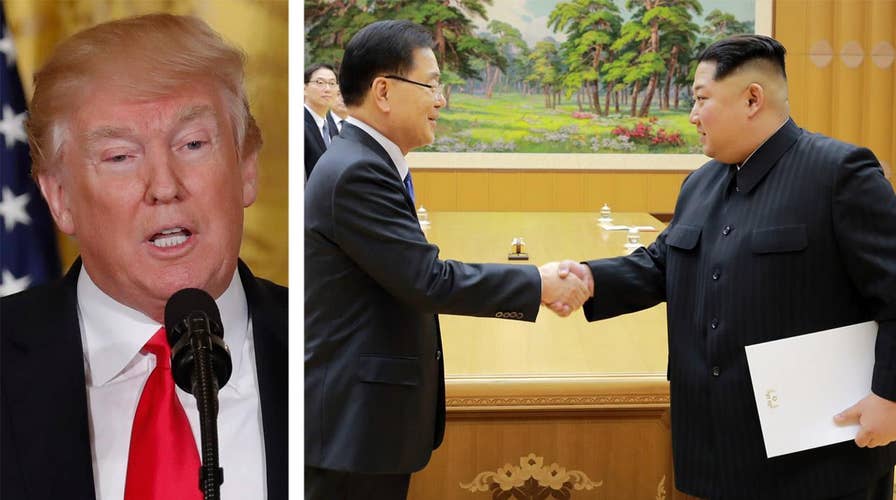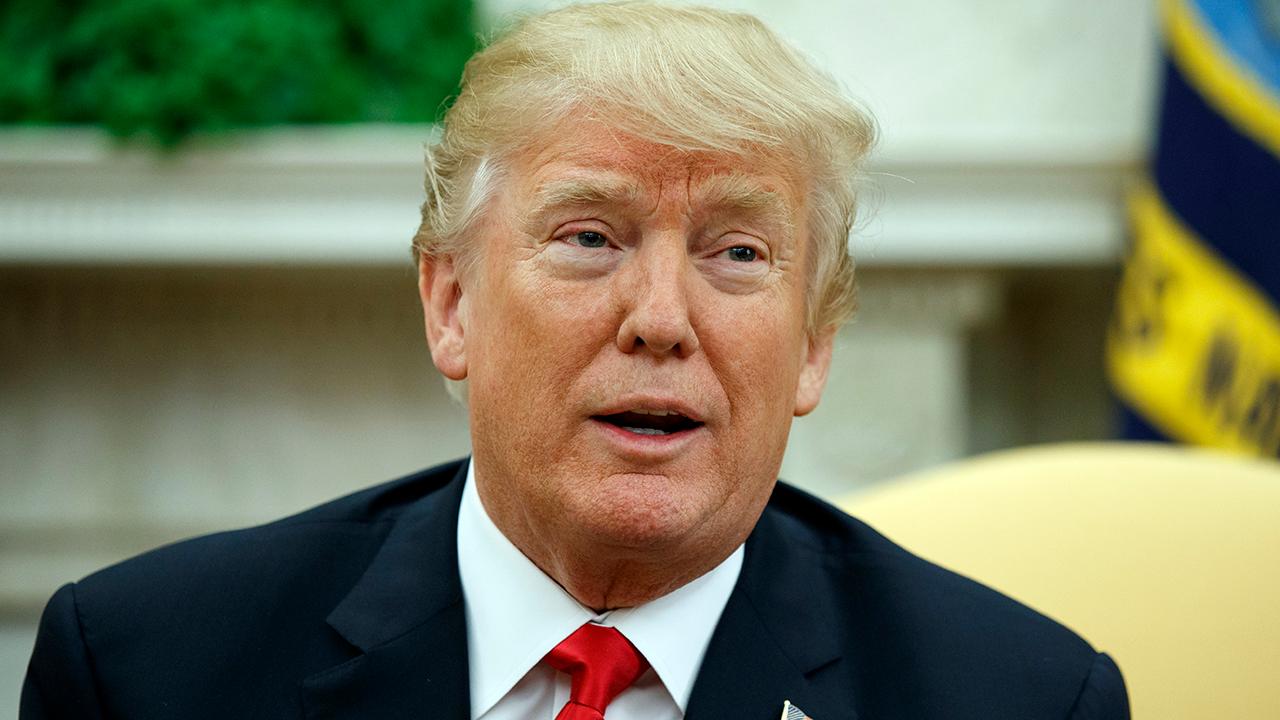President Trump cautiously optimistic about North Korea
Kim Jong Un signals he is willing to denuclearize North Korea if the U.S. agrees to talks; reaction and analysis on 'The Five.'
North Korea’s reported new willingness to discuss giving up its nuclear weapons is a sign that the Trump administration’s pressure campaign against the nation is working. But this does not mean that the U.S. should back off on sanctions.
Quite the contrary. We must continue to ratchet up pressure against the rogue regime if we want it to truly abandon its nuclear weapons and intercontinental ballistic missile programs.
The fact is that the latest round of sanctions announced two weeks ago will only incrementally add to the pressure on the North’s economy. They will not cripple it.
To really have an impact – and possibly deprive North Korean dictator Kim Jong Un of the ability to launch a horrific nuclear attack on the United States – we need to go one step further and mount a naval blockade on North Korea’s ports.
This is certainly a big step and it certainly carries dangers. But the dangers of North Korea hitting an American city with an atomic or hydrogen bomb are greater.
President Trump and Treasury Secretary Steven Mnuchin said the new round of sanctions they announced recently were the heaviest ever on North Korea. But in reality, the new measures are an effort to shore up the existing sanctions, not to impose new ones.
The new U.S. sanctions apply to 27 shipping companies and 28 ships registered in North Korea, China and five other nations that are helping the North Korea evade international restrictions on fuel imports and a ban on coal exports.
The American government is blocking assets held by the sanctioned entities in the U.S. and is barring U.S. citizens from dealing with those entities. The sanctions are designed to cut off foreign cash that North Korea desperately needs
As far as North Korea itself, the Trump administration issued a global shipping advisory outlining North Korea’s efforts to hide its sanctions violations by renaming its ships and using false ID numbers.
But although shipping companies from other countries were put on notice that trading with North Korea would subject them to heavy penalties, there is no reason to believe Chinese vessels and Chinese shipping companies, drawn by the prospect of profit (and perhaps secretly encouraged by China, North Korea’s ally) will not quickly take their place.
As for the North Koreans, they will certainly continue carrying out the elaborate ruses they have been successfully using to violate the existing sanctions. These include falsifying the names of their vessels and disabling their automatic identification systems to hide their movements. This enables them to secretly rendezvous at sea with Chinese and other vessels and carry out prohibited ship-to-ship transfers of fuel and other goods.
This nautical game of cops and robbers could continue for months or even years, as we continuously identify and sanction more and more vessels and companies in violation of the sanctions.
Unfortunately, we no longer have the luxury of waiting for this incremental approach to bring the rogue regime to its knees. As CIA Director Mike Pompeo has testified, North Korea is only “a handful of months” away from being able to nuke the United States.
There is only one way to cause the already isolated regime so much additional economic pain that it will be forced to abandon its nuclear and missile ambitions.
With or without China’s help, the U.S. and its allies must impose a blockade on North Korea’s ports.
The Trump administration should announce that all vessels bound to and from the major North Korean ports of Nampo, Haeju, and Hungnam will be interdicted and boarded, and that their cargos will be inspected. Those ships found to be engaged in smuggling would be immediately impounded. Only ships with cargos not violating the sanctions – those bringing food aid, for instance – would be allowed to continue on their way.
The announcement of such a blockade would be a shot across the bow of shipping companies, Chinese and otherwise, that might otherwise be tempted to violate the existing sanctions. At the very least, it would drive those attempting to engage in ship-to-ship transfers farther offshore, making it more likely that they would be stopped, boarded and impounded.
The chief argument against such a blockade is that China would not only refuse to participate, but would actively resist any effort to clamp down in its ally in this way. Remember, despite China’s ostensible participation in the sanctions regime, it continues to be bound to North Korea by a longstanding Mutual Security Treaty.
That is precisely why the U.S. must insist that the Chinese Navy be an integral part of a U.S.-led blockade. Beijing’s continued refusal would, at a minimum, make it apparent to the world that it had no intention of actually enforcing the sanctions against North Korea that it had earlier agreed to support.
In the absence of a naval blockade, Kim Jong Un will soon have an intercontinental ballistic missile capable of reaching the United States. When he does, he may indeed act on his threat to launch a missile across the Pacific in the general direction of, say, Hawaii.
If we thought the false alarm by Hawaii’s Emergency Management Agency sent shock waves of fear across the islands, wait until there is an actual ballistic missile on that same trajectory.
At that point, having lost the initiative, we will be left with only two alternatives. Do we launch a pre-emptive strike against North Korea’s nuclear and missile facilities, with all the risks that entails? Or do we accept the fact that North Korea has the capability to nuke American cities as the new status quo?
In that case, efforts to prevent the proliferation of nuclear weapons will have failed. Japan, South Korea and other countries will, of necessity, develop their own nuclear deterrents. The world will become a much more dangerous place.
Better a naval blockade now, with or without Chinese support, than living under the threat of a nuclear attack by the Madman of Pyongyang.


